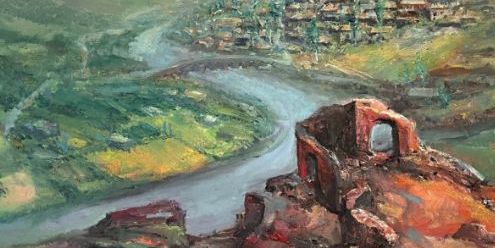Privileges and Nobility in Ottoman Kurdistan
hosted by Sam Dolbee
| As the Ottoman state expanded in the sixteenth century, it extended a number of privileges to elite families in Kurdistan. In this episode, Nilay Özok-Gündoğan discusses her new book The Kurdish Nobility in the Ottoman Empire, which explains how these hereditary privileges—unique in the empire—developed and changed in the region of Palu between this moment and the nineteenth century, when the Ottoman state attempted to rescind such autonomy. Writing against scholarship that either ignores such families or understands them only in nationalist terms, Özok-Gündoğan attends to property, labor, and mineral extraction and how they ultimately all shaped the nature of the unprecedented violence at the end of empire. She also discusses her own journey writing this book, including her time teaching in Mardin and eventually being forced to leave Turkey.
 | Click for RSS Feed | 
|

|
As the Ottoman state expanded in the sixteenth century, it extended a number of privileges to elite families in Kurdistan. In this episode, Nilay Özok-Gündoğan discusses her new book The Kurdish Nobility in the Ottoman Empire, which explains how these hereditary privileges—unique in the empire—developed and changed in the region of Palu between this moment and the nineteenth century, when the Ottoman state attempted to rescind such autonomy. Writing against scholarship that either ignores such families or understands them only in nationalist terms, Özok-Gündoğan attends to property, labor, and mineral extraction and how they ultimately all shaped the nature of unprecedented violence at the end of empire. She also discusses her own journey writing this book, including her time teaching in Mardin and eventually being forced to leave Turkey.
Contributor Bios
 |
Nilay Özok-Gündoğan is an Associate Professor of Ottoman and Middle East history at Florida State University. Her research centers on modern state-making, elite formation, property regimes, and intercommunal conflict and coexistence in the Ottoman Empire. Her work stands at the junction of interconnected Ottoman, Kurdish, Armenian, and Turkish histroies. She also writes about the question of methodology in Kurdish studies. She is the author of The Kurdish Nobility in the Ottoman Empire: Loyalty, Autonomy, and Privilege. |
 |
Sam Dolbee is Assistant Professor of History at Vanderbilt University, where he teaches classes on environment, disease, and the modern Middle East. His book Locusts of Power is out now with Cambridge University Press. |
Credits
Episode No. 550
Release Date: 20 September 2023
Recording location: Nashville, TN / Tallahassee, FL
Recording location: Nashville, TN / Tallahassee, FL
Sound production by Sam Dolbee
Music: Zé Trigueiros, "Big Road of Burravoe," "Chiaroscuro"
Bibliography courtesy of Nilay Özok-Gündoğan
Further Listening
 |
Metin Atmaca | 395
12/29/2018
|
Autonomy and Resistance in Ottoman Kurdistan |
 |
Linda Darling | 541
4/4/23
|
|
 |
Richard Antaramian | 527
5/4/22
|
The Catastrophic Success of the Armenian Tanzimat |
 |
Owen Miller and Ümit Kurt | 381
9/30/18
|
Violence and the Archives |
 |
Samuel Dolbee | 548
5/31/23
|
Environment and Empire in the Ottoman Jazira |
Select Bibliography

Gabor Agoston. ‘A Flexible Empire: Authority and Its Limits on the Ottoman Frontiers’, International Journal of Turkish Studies 9, nos 1–2 (2003): 15–32
Sacha Alsancakli. ‘Historiography and Language in 17th-Century Ottoman Kurdistan: A Study of Two Turkish Translations of the Sharafnāma’. Kurdish Studies 6, no. 2 (2018): 171–96.
Sabri Ateş. Ottoman–Iranian Borderlands: Making a Boundary, 1843–1914. (Cambridge: Cambridge University Press, 2015)
Djene Rhys Bajalan. ‘Şeref Xan’s Sharafnama: Kurdish Ethno-Politics in the Early Modern World, Its Meaning and Its Legacy’. Iranian Studies 45, no. 6 (2012): 795–818.
Mustafa Dehqan, and Vural Genç. ‘A Document on the Kurdish Hakkārī Claim to ‘Abbāsid Descent’. Fritillaria Kurdca. Bulletin of Kurdish Studies, no. 19–20 (2017): 4–13.
Anne Duggan. Nobles and Nobility in Medieval Europe: Concepts, Origins, Transformations. (King’s College London: Boydell & Brewer, 1998).
Halil İnalcik. ‘Temlîks, Soyurghals, Yurdluk-Ocaklıks, Mâlikâne-Mukâta’a and Awqaf’. In History and Historiography of Post-Mongol Central Asia and the Middle East. edited by John E. Woods and Ernest Tucker, 112–34. (Wiesbaden: Harrassowitz, 2006)
Janet Klein. The Margins of Empire: Kurdish Militias in the Ottoman Tribal Zone (Stanford, CA: Stanford University Press, 2011)
H. M. Scott ed. The European Nobilities in the Seventeenth and Eighteenth Centuries. (London ; New York: Addison-Wesley Longman Ltd, 1995).
Jay M. Smith. The French Nobility in the Eighteenth Century: Reassessments and New Approaches. Penn State Press, 2006.
Halil İnalcik. ‘Temlîks, Soyurghals, Yurdluk-Ocaklıks, Mâlikâne-Mukâta’a and Awqaf’. In History and Historiography of Post-Mongol Central Asia and the Middle East. edited by John E. Woods and Ernest Tucker, 112–34. (Wiesbaden: Harrassowitz, 2006)
Janet Klein. The Margins of Empire: Kurdish Militias in the Ottoman Tribal Zone (Stanford, CA: Stanford University Press, 2011)
H. M. Scott ed. The European Nobilities in the Seventeenth and Eighteenth Centuries. (London ; New York: Addison-Wesley Longman Ltd, 1995).
Jay M. Smith. The French Nobility in the Eighteenth Century: Reassessments and New Approaches. Penn State Press, 2006.











Comments
Post a Comment
Due to an overwhelming amount of spam, we no longer read comments submitted to the blog.